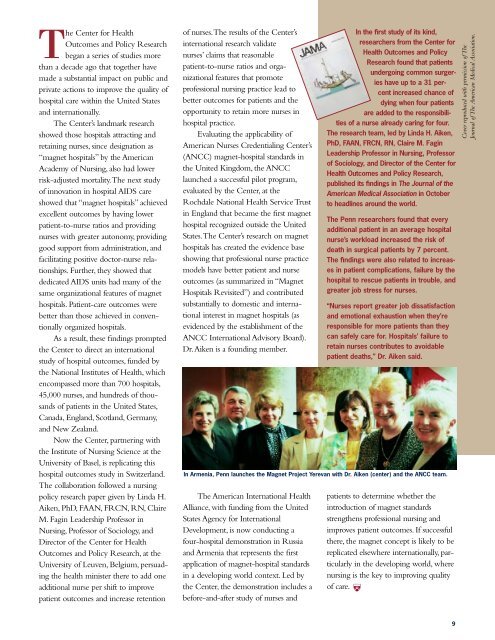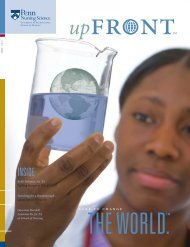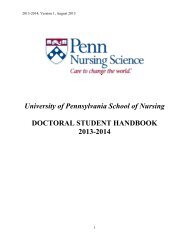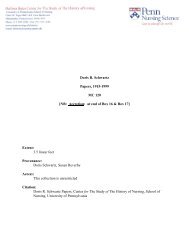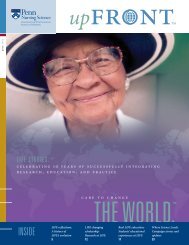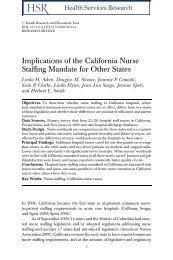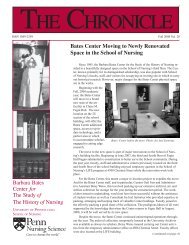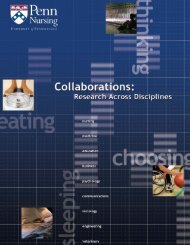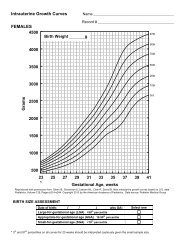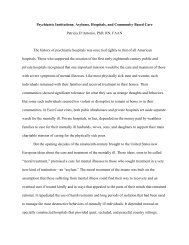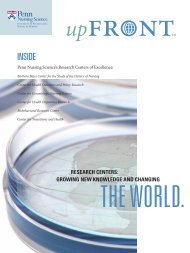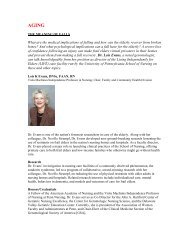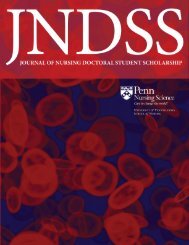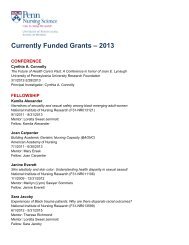Establishing Global Partnerships - University of Pennsylvania ...
Establishing Global Partnerships - University of Pennsylvania ...
Establishing Global Partnerships - University of Pennsylvania ...
You also want an ePaper? Increase the reach of your titles
YUMPU automatically turns print PDFs into web optimized ePapers that Google loves.
The Center for Health<br />
Outcomes and Policy Research<br />
began a series <strong>of</strong> studies more<br />
than a decade ago that together have<br />
made a substantial impact on public and<br />
private actions to improve the quality <strong>of</strong><br />
hospital care within the United States<br />
and internationally.<br />
The Center’s landmark research<br />
showed those hospitals attracting and<br />
retaining nurses, since designation as<br />
“magnet hospitals” by the American<br />
Academy <strong>of</strong> Nursing, also had lower<br />
risk-adjusted mortality.The next study<br />
<strong>of</strong> innovation in hospital AIDS care<br />
showed that “magnet hospitals” achieved<br />
excellent outcomes by having lower<br />
patient-to-nurse ratios and providing<br />
nurses with greater autonomy, providing<br />
good support from administration, and<br />
facilitating positive doctor-nurse relationships.<br />
Further, they showed that<br />
dedicated AIDS units had many <strong>of</strong> the<br />
same organizational features <strong>of</strong> magnet<br />
hospitals. Patient-care outcomes were<br />
better than those achieved in conventionally<br />
organized hospitals.<br />
As a result, these findings prompted<br />
the Center to direct an international<br />
study <strong>of</strong> hospital outcomes, funded by<br />
the National Institutes <strong>of</strong> Health, which<br />
encompassed more than 700 hospitals,<br />
45,000 nurses, and hundreds <strong>of</strong> thousands<br />
<strong>of</strong> patients in the United States,<br />
Canada, England, Scotland, Germany,<br />
and New Zealand.<br />
Now the Center, partnering with<br />
the Institute <strong>of</strong> Nursing Science at the<br />
<strong>University</strong> <strong>of</strong> Basel, is replicating this<br />
hospital outcomes study in Switzerland.<br />
The collaboration followed a nursing<br />
policy research paper given by Linda H.<br />
Aiken, PhD, FAAN, FRCN, RN, Claire<br />
M. Fagin Leadership Pr<strong>of</strong>essor in<br />
Nursing, Pr<strong>of</strong>essor <strong>of</strong> Sociology, and<br />
Director <strong>of</strong> the Center for Health<br />
Outcomes and Policy Research, at the<br />
<strong>University</strong> <strong>of</strong> Leuven, Belgium, persuading<br />
the health minister there to add one<br />
additional nurse per shift to improve<br />
patient outcomes and increase retention<br />
<strong>of</strong> nurses.The results <strong>of</strong> the Center’s<br />
international research validate<br />
nurses’ claims that reasonable<br />
patient-to-nurse ratios and organizational<br />
features that promote<br />
pr<strong>of</strong>essional nursing practice lead to<br />
better outcomes for patients and the<br />
opportunity to retain more nurses in<br />
hospital practice.<br />
Evaluating the applicability <strong>of</strong><br />
American Nurses Credentialing Center’s<br />
(ANCC) magnet-hospital standards in<br />
the United Kingdom, the ANCC<br />
launched a successful pilot program,<br />
evaluated by the Center, at the<br />
Rochdale National Health Service Trust<br />
in England that became the first magnet<br />
hospital recognized outside the United<br />
States.The Center’s research on magnet<br />
hospitals has created the evidence base<br />
showing that pr<strong>of</strong>essional nurse practice<br />
models have better patient and nurse<br />
outcomes (as summarized in “Magnet<br />
Hospitals Revisited”) and contributed<br />
substantially to domestic and international<br />
interest in magnet hospitals (as<br />
evidenced by the establishment <strong>of</strong> the<br />
ANCC International Advisory Board).<br />
Dr.Aiken is a founding member.<br />
In Armenia, Penn launches the Magnet Project Yerevan with Dr. Aiken (center) and the ANCC team.<br />
The American International Health<br />
Alliance, with funding from the United<br />
States Agency for International<br />
Development, is now conducting a<br />
four-hospital demonstration in Russia<br />
and Armenia that represents the first<br />
application <strong>of</strong> magnet-hospital standards<br />
in a developing world context. Led by<br />
the Center, the demonstration includes a<br />
before-and-after study <strong>of</strong> nurses and<br />
In the first study <strong>of</strong> its kind,<br />
researchers from the Center for<br />
Health Outcomes and Policy<br />
Research found that patients<br />
undergoing common surgeries<br />
have up to a 31 percent<br />
increased chance <strong>of</strong><br />
dying when four patients<br />
are added to the responsibilities<br />
<strong>of</strong> a nurse already caring for four.<br />
The research team, led by Linda H. Aiken,<br />
PhD, FAAN, FRCN, RN, Claire M. Fagin<br />
Leadership Pr<strong>of</strong>essor in Nursing, Pr<strong>of</strong>essor<br />
<strong>of</strong> Sociology, and Director <strong>of</strong> the Center for<br />
Health Outcomes and Policy Research,<br />
published its findings in The Journal <strong>of</strong> the<br />
American Medical Association in October<br />
to headlines around the world.<br />
The Penn researchers found that every<br />
additional patient in an average hospital<br />
nurse’s workload increased the risk <strong>of</strong><br />
death in surgical patients by 7 percent.<br />
The findings were also related to increases<br />
in patient complications, failure by the<br />
hospital to rescue patients in trouble, and<br />
greater job stress for nurses.<br />
“Nurses report greater job dissatisfaction<br />
and emotional exhaustion when they’re<br />
responsible for more patients than they<br />
can safely care for. Hospitals’ failure to<br />
retain nurses contributes to avoidable<br />
patient deaths,” Dr. Aiken said.<br />
patients to determine whether the<br />
introduction <strong>of</strong> magnet standards<br />
strengthens pr<strong>of</strong>essional nursing and<br />
improves patient outcomes. If successful<br />
there, the magnet concept is likely to be<br />
replicated elsewhere internationally, particularly<br />
in the developing world, where<br />
nursing is the key to improving quality<br />
<strong>of</strong> care.<br />
Cover reproduced with permission <strong>of</strong> The<br />
Journal <strong>of</strong> The American Medical Association.<br />
9


